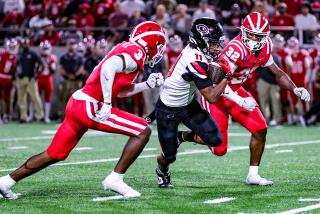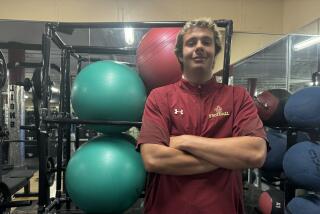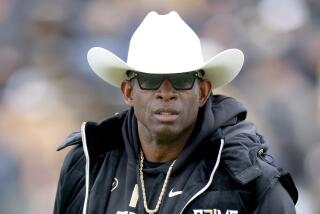‘Jerry’s Kids’ : Liberty Baptist Football Players Will Knock You Down First, Save You Later
- Share via
LYNCHBURG, Va. — When you play football for Jerry Falwell’s school, you are called all sorts of things, not the least of which is one of “Jerry’s Kids.” So what the Liberty University Flames like to do is get teams up here on this Blue Ridge mountainside and show off the full implications of the term, “muscular Christian.”
Liberty is a school steeped in Falwell’s new fundamentalism, but that does not lessen the NCAA Division II Flames’ considerable ambition. Their idea is to turn all this high-minded fervor into hurt on the football field, but when it’s over and they’ve won, they’ll shake your hand and ask if you’ve been saved.
“Our goal is to be the hardest-hitting team anyone has ever played,” said running back Jacob Pope. “We don’t want them looking at us as a pansy team or a schedule-builder. Their idea of being a Christian is a little-bitty guy carrying a big Bible. What we do is outhustle people, knock their heads off and they’ll say, ‘These guys are different.’
“We can reach people Dr. Falwell can’t even reach. Of course, it’s hard sometimes to show them the love of Christ after we’ve beat them up and down the field. You say, ‘Hey, Jesus loves you,’ and they don’t exactly understand.”
The partly makeshift campus of Liberty, established in 1971 with classes in Falwell’s Thomas Road Baptist Church, is becoming ever more entrenched atop Liberty Mountain. The front side overlooks Lynchburg, “City of Churches,” and the other side served as the birthplace of Falwell, the university’s chancellor and former fullback and captain of the Brookville High team.
The school, formerly known as Liberty Baptist College, is the jewel of Falwell’s $100 million operation, a training ground for fundamentalism, and he says it is the fastest-growing university in the nation.
Football is close to the heart of Falwell, perhaps because he was too slight to play the game in college. This is why, at any given Sunday service, he breaks up his announcements from the pulpit of his 21,000-member church (“Will the owner of a green Skylark please go to the parking lot”) with the Flames’ scores and attendance. “We had 7,000 yesterday. Let’s make a vow right now that we won’t have a single poorly attended game this season.”
Falwell’s Moral Majority lobbying arm brings fundamentalism into politics, in keeping with his philosophy of conquering a lost world for Jesus Christ. So it is not surprising that Falwell also has big plans for the Flames, who field only born-again Christian athletes and do quite respectably with them. By 1987, Falwell intends for the Flames to be Division I-AA and the next step is beautifully logical: Go Division I and beat Notre Dame.
“We’d like to beat Notre Dame,” Falwell says. “Of course, when we get good enough, they have to schedule us.”
Liberty started playing football in 1973 and the original team went 3-3, against a mix of junior college, junior varsity and prep school teams. But by 1980, the Flames were 7-3, playing their first Division I-AA schools. In Coach Morgan Hout’s first season, they went 5-6, and this season they are 3-1, including an upset of James Madison two weeks ago.
The low-slung, utilitarian brick campus rings with the sound of praising the Lord, with a background of hammering as the future of fundamentalism is slapped together at a rate of $12 million in construction a year. So much work is going on at the 4,400-acre school that the phone lines are constantly being dug up and temporary trailers dot the half-finished landscaping.
Enrollment increased from 4,500 to 6,900 this year, and just last month it became a fully accredited university, dropping the Baptist from its name. Falwell plans to have 50,000 students by the turn of the century.
“We argue,” Falwell said, “that there are enough born-agains in this country and around the world to excel in any field, athletics or otherwise.”
Although students and athletes are not required to subscribe to Falwell’s arch-conservative political views, or to be Baptists, they are required to be born-again Christians and conform to the school’s rules of conduct. Students are not allowed to drink or smoke, film and television viewing is censored (no Norman Lear) and rock ‘n roll is forbidden, although Amy Grant’s gospel rock is OK.
Men wear coats and ties to class and must have their hair an inch above the collar. Dresses or skirts only are permitted for women. Freshmen and sophomores can only double date, and any interracial couple must have their parents’ permission to date.
Such rules might be expected to drive a blue-chip player straight to a secular school. School administrators frankly say the school is “not for everybody,” and an athlete thinking of cashing in on a scholarship and ignoring the school’s spiritual leaning would find it impossible, not to mention uncomfortable.
“There is a lot I agree with and a lot I don’t, but they are rules and they have to be followed,” Pope said. “For instance, I don’t like being told to turn my lights out or to be in bed. You should go to church, but being told to do it makes you want to go catch a movie. But the people who don’t give a damn are going to do what they want to, anyway, and the rules need to be followed.”
Despite the rules, Liberty has gotten its share of quality athletes, as evidenced by its six pro football alumni, among them all-America receiver Fred Banks, drafted by the Cleveland Browns this season. According to Liberty administrators, who make frequent references to help from higher up, recruiting has not been difficult.
“The Lord has been my recruiter,” said Athletic Director Al Worthington, a 14-year major league pitcher who also coaches Liberty’s baseball team, ranked fifth in the NAIA in 1983, and which has already jumped to NCAA Division I. “I’ve hardly gotten out of this chair to recruit. He has sent us these athletes and blessed us with good teams. Now we have to move forward and work a little harder. . . . But if I bring a guy in here who doesn’t like it and quits because he doesn’t want to wear a tie, that doesn’t do us any good. They should want to come here for the right reasons. Otherwise, they can go somewhere else and stay out all night.”
To avoid bringing in uncommitted athletes who might “spiritually bag it,” as Hout says, Liberty screens its prospects and, to better focus on the more likely candidates, recruits almost exclusively in Sun Belt and Bible Belt areas.
The Flames are helped considerably by the increasingly conservative climate nationwide, and by Falwell’s considerable resources. Falwell’s high-profile forums include two gospel-hour television programs with viewers numbering 13 million, a Moral Majority newspaper with 1 million subscribers, and a fundamentalist magazine with 70,000 readers. To put it simply, that is one swell recruiting operation, and it is perhaps partly responsible for the Flames’ rapid rise.
“You can look at it two ways,” said recruiting coordinator Kim Graham. “It’s probably the biggest detriment you could have. But it’s also the greatest asset, once you identify the Christians. And you’ve got the power of prayer. We ask the Lord to lead us to the kids. A lot of people say, well then why don’t you just sit there and pray them in. But works go with prayer.”
The first question a prospect is asked is whether he is a Christian. But the Flames run into misunderstandings on occasion, simply because many 18-year-olds don’t understand the complexities of fundamentalism. A second step is an interview with a high school coach about the prospect’s religious affiliation. That, however, also can be difficult, according to Graham, who recently had the following conversation.
Graham: “Is he a Christian?”
Coach: “Sure, he is. Of course, he’ll have a beer occasionally.”
Graham: “That’s not exactly what I meant.”
The Flames also work at an admitted disadvantage because of rumors that circulate about the school and the rigidity of the rules. The most frequently asked questions are whether Liberty plays a real schedule, whether it has real uniforms and whether students are really required to wear three-piece suits. To offset that, the Flames use frequent comparisons to Brigham Young University, which requires a two-year Mormon missionary commitment, as well as Notre Dame and the service academies.
“I like to say it’s a lot like Brigham Young,” said Hout. “But at least here we get to drink Cokes.”
Liberty is earnest about its recruiting, but never will indulge in recruiting wars that might lead to NCAA violations, said Falwell, who not unpredictably favors even tougher NCAA rules and enforcement. “As a Christian institution, we could not afford any blemish for conduct,” he said.
Any question about Liberty’s seriousness in establishing a top-ranked program, however, is settled at once by Falwell. The reverend never has missed a home game, despite a schedule that requires him to travel as much as 8,000 miles a week for as many as 25 speaking engagements.
“Winning is very important to us,” Falwell said.
More to Read
Go beyond the scoreboard
Get the latest on L.A.'s teams in the daily Sports Report newsletter.
You may occasionally receive promotional content from the Los Angeles Times.










